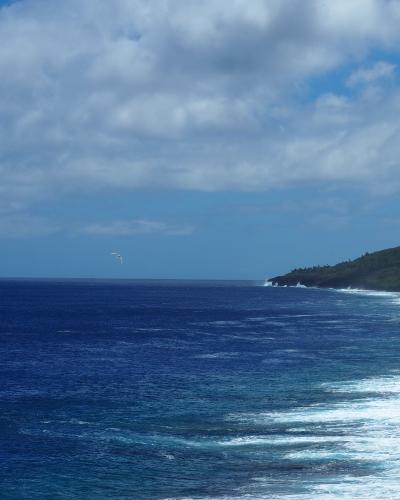Pacific island nations are urbanizing quickly, bringing growth opportunities as well as familiar challenges related to sprawl. ADB, Ireland, and the Netherlands are supporting a facility that helps Pacific countries prepare and plan for their growing cities to ensure that their people can thrive in livable, sustainable, and resilient communities.
Listen to the story
urbanization curveball
The Pacific islands are on a fast track to urbanization, driven by internal migration from rural to urban areas as people seek better opportunities and improved access to government services. This growth brings opportunities and challenges, particularly as cities struggle to keep pace with infrastructure and services.
Urban growth in the Pacific mirrors trends across Asia. However, like in most of Asia, cities expand outpacing the growth of infrastructure and provision of services. As populations concentrate in cities, essential services like clean water supply, sanitation, flood protection and control, waste management, housing, and public transport become increasingly strained.
In larger Pacific countries, like Solomon Islands, which are still mostly rural, urbanization is accelerating, fueling a demand for urban infrastructure investment. Meanwhile, smaller, low-lying spots like the Marshall Islands face heightened risks from unplanned urban expansion, exposing the people and critical infrastructure and assets to natural hazards. Integrating risk-informed development could reduce this vulnerability.
While urbanization fosters economic growth and improves living standards, poor planning exacerbates vulnerability to climate impacts and natural hazards. Additionally, the provision of basic services becomes challenging. Investments in sustainable urban development are needed to ensure Pacific island countries become livable, economically vibrant, and resilient.
preparing investment projects in pacific cities
To help Pacific nations prepare for urban expansion, a technical assistance (TA) facility— the Pacific Urban Development Investment Project Enhancement and Capacity Development Facility—was launched. The TA is cofinanced by the Ireland Trust Fund for Building Climate Change and Disaster Resilience in Small Island Developing States and the Water Resilience Trust Fund under the Water Financing Partnership Facility with contributions from the Netherlands. It underwent some changes in implementation and funding, and now it supports all 14 Pacific developing member countries (DMCs) in urban development planning and implementation.
The TA aims to strengthen urban infrastructure and governance across the region through three key outputs. First, to prepare feasibility studies for future urban development projects by providing technical expertise to help countries prioritize and plan investments suitable for ADB financing.
Second, to deliver demand-driven technical advice, assessments, and capacity development to improve project sustainability, financial planning, and diagnostic analysis—ensuring that urban investments are effective and resilient.
And third, to promote knowledge sharing by facilitating regional workshops, trainings, and conferences. These events foster collaboration among Pacific DMCs and key regional institutions, such as the Pacific Water and Wastewater Association, enhancing the exchange of lessons learned and best practices. Overall, this TA facility aims to build stronger urban development frameworks and regional cooperation across the Pacific.
The TA also aims to encourage private sector and civil society participation in delivering urban infrastructure and services.
One key initiative from the TA is in the Solomon Islands where it focuses on sustainable land planning in the towns of Noro and Munda, Western Province, ensuring resilience and inclusivity, from inception. In Fiji, the facility supports a performance-based contract aimed at reducing water wastage. With non-revenue water estimated at 48%, costing some F$23 million annually, which is equivalent to 18.5% of the overall operating costs, this project seeks to reduce water losses to 20% through a sustainable approach.
“Pacific countries need support to help plan for and manage their urban growth, so that their communities are livable, growing, sustainable, and resilient. This technical assistance from ADB helps Pacific countries boost their capabilities and helps them manage the challenge of urban growth.”

laying the groundwork for livable cities
A minor change in implementation arrangements accommodated the expanded scope under the TA, to support emerging needs in Pacific DMCs. The TA facility aims to support urban development projects by addressing critical technical, financial, social, and environmental considerations.
On the first output, the TA is assisting in the preparation of a multi-tranche financing facility for Papua New Guinea’s (PNG) Urban Water Supply and Sanitation Security and Resilience Investment Program, targeted for approval in the latter part of 2025. This includes technical assessments of climate-resilient water resources planning and development for Port Moresby, such as the Rouna cascade raw water facility and Mt. Eriama water treatment plant optimization and expansion. The capacity-building component of the program will enhance Water PNG’s institutional and operational effectiveness. The TA directly supported relevant due diligence of the priority subprojects and has enhanced design and procurement readiness of the investment program.
On the second result area, support is allocated to develop Fiji’s water and sewerage tariff framework. Support is provided in the design of a building block-based framework that incorporates resilience, affordability, and efficiency. Additionally, performance targets, stakeholder consultation materials, evaluation metrics, and training for the Fijian Competition and Consumer Commission and Water Authority of Fiji, are provided.
Thirdly, the TA supports the annual Pacific Water and Wastewater Association (PWWA) Conference and Expo along with the Water Ministers Forum. Uniquely Pasifika, the conference brings together all 30 water and wastewater utilities from the 21 countries and territories of the Pacific, becoming a unique space for knowledge sharing and strengthening collaboration in the Pacific.
As urbanization accelerates, sustainable planning and investment will be crucial to shaping cities that are not only economically vibrant but also resilient to environmental challenges. Through collaborative efforts—with partners like ADB, Ireland, and the Netherlands—Pacific nations can build urban centers that support their people’s aspirations while safeguarding their future.

